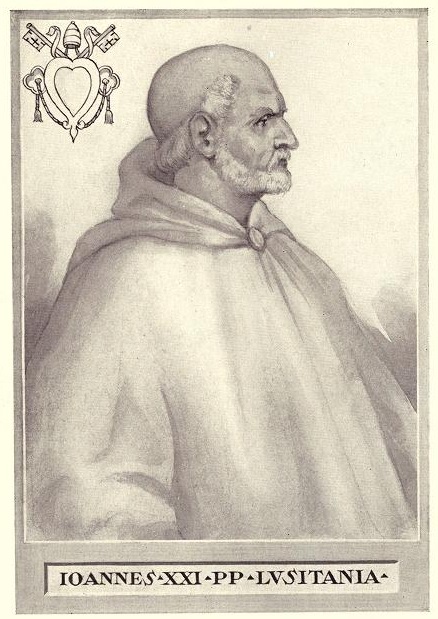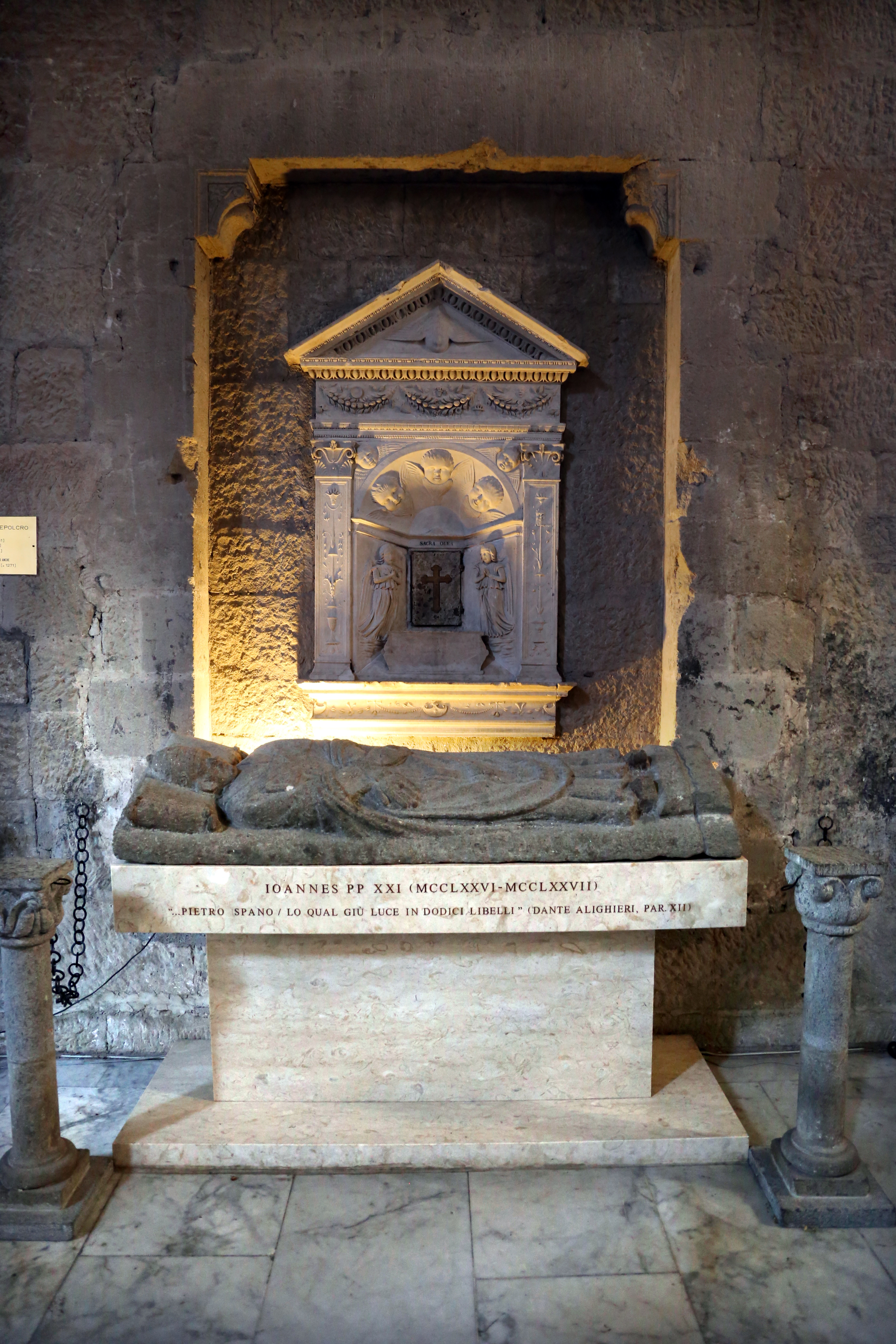1. Overview

Pope John XXI (born Pedro Julião or Pedro de Espana, Petrus IulianusLatin, Pedro HispanoPortuguese) was the 187th Bishop of Rome and head of the Catholic Church from September 8, 1276, until his death on May 20, 1277. He holds the unique distinction of being the only ethnically Portuguese pope in history, though Pope Damasus I was born in what is now Portugal. He is widely identified with the renowned logician and physician Peter of Spain, making him the sole pope to have practiced medicine. His brief pontificate, lasting only eight months, was marked by efforts to promote peace among Christian nations and attempts to launch a new crusade.
2. Early Life and Background
Pedro Julião was born in Lisbon, Portugal, between 1210 and 1220, with some sources specifying 1215 as his birth year. His parents were Julião Pais, who served as chancellor to King Sancho I and Afonso Henriques, and Mor Mendes. Other accounts suggest his father was a physician named Juliaxo Rebelo and his mother was Teresa Gil. He began his education at the episcopal school of Lisbon Cathedral.
2.1. Education and Academic Pursuits
Following his studies at the Lisbon Cathedral school, Pedro Julião continued his academic journey at the University of Paris. Some historians, however, contend that he received his education at Montpellier. Regardless of the specific institution, his studies were extensive and focused on a wide array of subjects, including medicine, theology, logic, physics, metaphysics, and Aristotle's dialectic. His deep engagement with these disciplines laid the foundation for his later significant contributions as a scholar.
3. Career as a Scholar
Before his elevation to the papacy, Pedro Julião was widely known as Peter of Spain (Petrus HispanusLatin), a name derived from his Iberian origin. He was a prominent figure in medieval European intellectual history, particularly recognized for his work in logic and pharmacology. He taught medicine at the University of Siena during the 1240s, with some sources specifying the period between 1245 and 1250. His scholarly output included his most famous work, Summulae Logicales, and potentially the medical text Thesaurus Pauperum, though its authorship remains debated. He also contributed to the field of optics.
3.1. Logic and Summulae Logicales
Peter of Spain's most celebrated work is Summulae Logicales (Summulae LogicalesLatin, "Treatises on Logic"). This book became a cornerstone of medieval education, serving as a widely used university textbook on Aristotelian logic for over three centuries across European universities. It is considered one of the most typical scholastic logic books published in 13th-century Europe. The work saw hundreds of editions and is regarded today as essential reading for understanding the foundations of medieval European scholarship. Its widespread adoption underscores its profound influence on the development of medieval logic.
3.2. Medicine and Other Writings
Beyond logic, Peter of Spain was a practicing physician, a unique background among popes. His medical contributions include the debated authorship of Thesaurus Pauperum (Thesaurus PauperumLatin, "Poor Man's Treasure"). This work is notable for being one of the most comprehensive guides on contraception, discussing methods for use before and after sexual intercourse, as well as techniques to induce menstruation. Modern research suggests that many of the methods described in Thesaurus Pauperum were highly effective, leading to a contemporary understanding that women in classical antiquity may have had greater control over childbirth than previously assumed. In addition to his medical and logical works, Peter of Spain also authored treatises on optics, further demonstrating his diverse academic interests and contributions.
4. Service in Church and Royal Court
Pedro Julião's career before becoming pope was multifaceted, involving significant roles within both the Church hierarchy and the Portuguese royal court. He served as a councilor and spokesman for King Afonso III on ecclesiastical matters at the court in Lisbon. He also held the position of prior of Guimarães. Within the Church, he was the Archdeacon of Vermoim (Vermuy) in the Archdiocese of Braga. He made an attempt to become Bishop of Lisbon but was unsuccessful. Instead, he became the Master of the school of Lisbon. His medical expertise led him to serve as the personal physician to Pope Gregory X early in Gregory's pontificate. In March 1273, he was elected Archbishop of Braga, but he did not take up this post. Instead, on June 3, 1273, Pope Gregory X elevated him to the rank of Cardinal Bishop of Tusculum (Frascati).
5. Cardinalate
Pedro Julião's appointment as Cardinal Bishop of Tusculum (Frascati) on June 3, 1273, by Pope Gregory X marked a significant advancement in his ecclesiastical career. During his time as a cardinal, he continued to be a trusted advisor, particularly to Pope Gregory X, whose physician he had been. While specific detailed activities during his cardinalate are not extensively documented beyond his elevation, this period served as a crucial stepping stone that positioned him for the highest office in the Catholic Church.
6. Papacy
Pedro Julião's pontificate as Pope John XXI was brief but notable for several key policies and administrative aspects, though much of his reign was influenced by powerful figures within the Roman Curia.
6.1. Election and Reign
Following the death of Pope Adrian V on August 18, 1276, Pedro Julião was elected as the new pope on September 8, 1276. His coronation took place a week later, on September 20. He adopted the regnal name John XXI, despite being the 20th pope named John, a numbering anomaly that has been noted in papal history. His papacy lasted just over eight months, concluding with his death on May 20, 1277.
6.2. Major Policies and Activities
During his short reign, Pope John XXI undertook several significant initiatives. One of his first acts was to reverse a decree concerning the papal conclave that had been recently passed at the Second Council of Lyon in 1274. This decree had mandated strict isolation for cardinals during papal elections and progressively restricted their food and wine supplies if deliberations extended too long. John XXI's reversal aimed to alleviate these stringent conditions.
He also actively pursued broader objectives for the Christian world. He attempted to launch a new crusade to reclaim the Holy Land and worked towards the union of the Eastern Church with the Catholic Church. Furthermore, he dedicated efforts to maintaining peace among Christian nations. In terms of external relations, he excommunicated Afonso III of Portugal for interfering with episcopal elections in Portugal and dispatched legates to Kublai Khan. He also planned a mission to convert the Tatars, though he died before this initiative could commence.
6.3. Papal Administration and Influence
Despite his own scholarly and medical background, Pope John XXI's papacy was significantly influenced by other powerful figures. His reign was largely dominated by Cardinal Giovanni Gaetano Orsini, who would later succeed him as Pope Nicholas III. John XXI was not considered particularly skilled in political or church administration, which led him to rely heavily on Cardinal Orsini for the management of church affairs. To facilitate his personal studies, particularly in medicine, he had a new apartment constructed at the papal palace in Viterbo, a space where he could retreat for undisturbed work.
7. Death

Pope John XXI's pontificate came to an abrupt end due to an unfortunate accident. On May 14, 1277, while he was alone in his newly constructed apartment at the papal palace in Viterbo, the ceiling of the room suddenly collapsed. John XXI was rescued alive from beneath the rubble, but he had sustained severe injuries. He succumbed to these injuries six days later, dying on May 20, 1277. His death is possibly an early recorded case of crush syndrome. He is believed to be the only pope in history to have died from an accidental building collapse.
He was buried in the Viterbo Cathedral (Duomo di Viterbo), where his tomb can still be seen. The original porphyry sarcophagus that housed his remains was destroyed during a 16th-century refurbishment of the cathedral. It was subsequently replaced with a more modest stone sarcophagus featuring the pope's effigy. In the 19th century, the Duke of Saldanha, serving as the Portuguese Ambassador to the Holy See, arranged for John XXI's remains to be transferred to a new sarcophagus sculpted by Filippo Gnaccarini. In March 2000, the Lisbon City Council, under Mayor João Soares, successfully commissioned and installed a new funeral monument made of lioz stone, topped by the original stone effigy of the pope, placing it in a more prominent location within the cathedral's transept.
8. Legacy and Historical Evaluation
Pope John XXI's legacy is a blend of significant scholarly achievement and intriguing posthumous reputation, reflecting his unique position as a physician and logician among the popes.
8.1. Literary Mentions and Posthumous Rumors
After his death, rumors circulated that John XXI had been a necromancer, a suspicion sometimes directed at the few scholars who became popes in the Middle Ages, such as Pope Sylvester II. It was also suggested that his death was an act of God, preventing him from completing a supposed heretical treatise.
However, his scholarly contributions were widely recognized and appreciated. The renowned Italian poet Dante Alighieri offered a positive portrayal of "Pietro Spano" (Peter of Spain) in his epic poem, the Divine Comedy. In the Paradiso, Dante places him in the Sphere of the Sun alongside the spirits of other great religious scholars, acknowledging his intellectual eminence.
8.2. Academic Influence and Evaluation
Pope John XXI's most enduring academic influence stems from his work in logic, particularly his Summulae Logicales. This textbook had a profound and lasting impact on medieval education, being used for centuries across European universities and undergoing hundreds of editions. Its historical evaluation consistently highlights its foundational role in the study of Aristotelian logic and its importance for understanding the intellectual landscape of the 13th century.
His background as a physician also sets him apart. Although the authorship of his medical work, Thesaurus Pauperum, is debated, it contained advanced and practical advice on contraception and menstrual induction. This aspect of his scholarly output, regardless of definitive authorship, points to a period where medical knowledge, even on sensitive topics, was being systematically compiled and disseminated. His contributions in optics further demonstrate his broad intellectual curiosity and capacity for academic inquiry. Historically, he is uniquely remembered as the only physician to have ever ascended to the papacy.